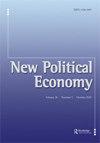Decarbonising states as owners
IF 3.8
2区 经济学
Q1 ECONOMICS
引用次数: 4
Abstract
ABSTRACT Environmental state debates focus on the governance and steering functions of politics. Concurrently, many states stand out as large global owners and investors in carbon industries. Via various investment vehicles, states control around half of all global oil and gas reserves as well as other carbon assets. We know very little, however, about where these states are invested; how they conduct their carbon investment; and what possibilities and constraints carbon-owning states have to decarbonise. Yet, these aspects – the geography, investment profiles and domestic state carbon capital dependence – are key to assess the possibilities and limitations of climate action states as carbon owners have. Based on new fine-grained firm-level data, we deliver conceptual and empirical insights into all three issues. Our intervention fills an important gap in our knowledge about the environmental state, while drawing the attention of researchers and policymakers to a blind spot, but also to transformation potentials of the carbon-owning state in the following decade.脱碳的国家是所有者
环境国家的争论集中在政治的治理和指导功能上。与此同时,许多国家作为全球碳产业的大型所有者和投资者脱颖而出。通过各种投资工具,各国控制着全球约一半的石油和天然气储量以及其他碳资产。然而,我们对这些州的投资情况知之甚少;他们如何进行碳投资;以及拥有碳的国家去碳化的可能性和限制。然而,这些方面——地理、投资概况和国内国家对碳资本的依赖——是评估气候行动国家作为碳所有者的可能性和局限性的关键。基于新的细粒度企业层面的数据,我们提供了对这三个问题的概念和实证见解。我们的干预填补了我们对环境状态知识的一个重要空白,同时将研究人员和政策制定者的注意力吸引到一个盲点,同时也吸引了碳拥有国在未来十年的转型潜力。
本文章由计算机程序翻译,如有差异,请以英文原文为准。
求助全文
约1分钟内获得全文
求助全文
来源期刊

New Political Economy
Multiple-
CiteScore
10.10
自引率
9.50%
发文量
41
期刊介绍:
New Political Economy aims to create a forum for work which combines the breadth of vision which characterised the classical political economy of the nineteenth century with the analytical advances of twentieth century social science. It seeks to represent the terrain of political economy scholarship across different disciplines, emphasising original and innovative work which explores new approaches and methodologies, and addresses core debates and issues of historical and contemporary relevance.
 求助内容:
求助内容: 应助结果提醒方式:
应助结果提醒方式:


